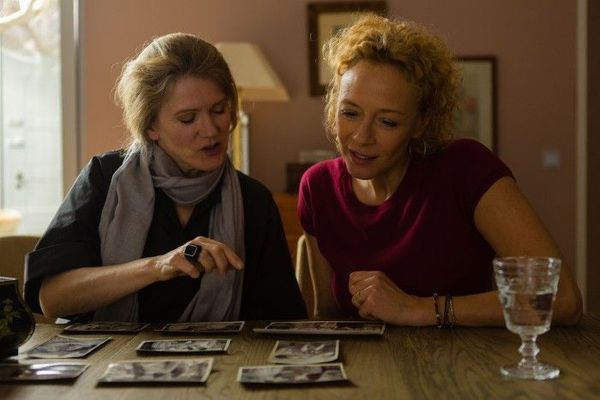Eye For Film >> Movies >> The Misplaced World (2015) Film Review
The Misplaced World
Reviewed by: Amber Wilkinson

Margarethe von Trotta's The Misplaced World fails to find a stable tone or a sustainable story despite the best efforts of the main cast and a promising start, which follows the continuing trend of doppelganger cinema, which seems to have had a resurgence lately with the likes of The Double and Enemy. This time around, the setting is considerably more domestic, when humanist wedding provider and part-time jazz chanteuse Sophie (Katja Riemann) gets a call from her father (Matthias Habich). He tells her that he has come across an opera singer online who is the spitting image of her recently deceased mum. "It's as though she has risen from the dead," he says, offering the sort of needlessly portentous observation that eventually bogs down the script - particularly in its English-language segments.
Persuaded to head to the States, Sophie quickly discovers that her mother's lookalike Caterina (Barbara Sukowa) is the epitome of an operatic diva - so close to parody, in fact, as to make many of her scenes laughable - happily slapping those who irritate her and generally being unpleasant to everyone except her son. That Sukowa manages to retain any shred of sympathy for her is a huge testament to her acting ability in the face of one-note scripting.

Her refusal to engage with Sophie would mark the end of the story were it not for what, if you want to be kind, might be referred to as a 'plot development'. In fact, the abrupt love-at-first-sight romance between Sophie and Caterina's agent Philip (Robert Seeliger) is little more than a sledgehammer device to keep Sophie in the hunt. Their affair is characterised by some of the least convincing English language dialogue I've heard in a long time, with the otherwise seemingly sensible Sophie tumbling into bed with the wolf-like American, with little more than an, "If you sleep with me, I'll help you".
It is this tin ear for English which really undoes the film, as each scene between Riemann and Seeliger becomes unintentionally funny. The mystery surrounding the women is nowhere near exciting enough to hold the interest either. It involves the secrets and lies of the previous generation, which could be revealed in about half the time but are dragged out as the characters jaunt back and forth across the Atlantic as though it was little more than a puddle, with several suddenly producing literal 'boxes of secrets' to gee-up the plot. Somewhere, in the sparkle of grief in the eyes of Riemann when her character first comes face to face with her mother's doppelganger, you see a reflection of the emotional drama that might have been, but von Trotta misplaces her attention.
Reviewed on: 18 Feb 2015















